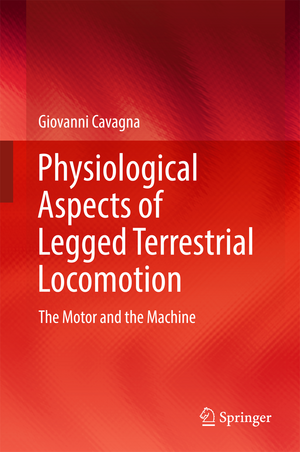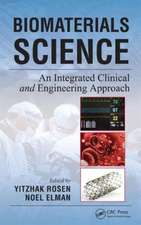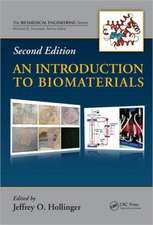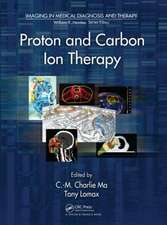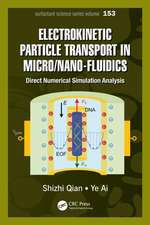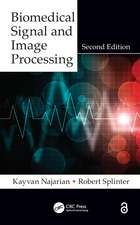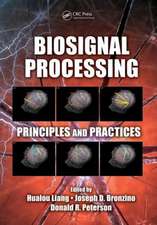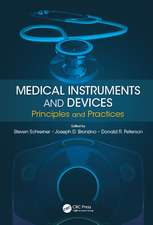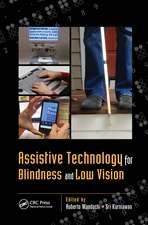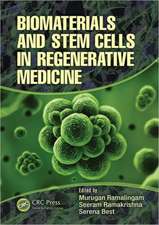Physiological Aspects of Legged Terrestrial Locomotion: The Motor and the Machine
Autor Giovanni Cavagnaen Limba Engleză Hardback – 19 feb 2017
Further, the book reports on the design and results of experiments conducted with two goals. The first was to describe the physiological function of muscle tissue (which may be considered as the “motor”) contracting at a constant length, during shortening, during lengthening, and under a condition that occurs most frequently in the back-and-forth movement of the limbs during locomotion, namely the stretch-shortening cycle of the active muscle. The second objective was to analyze the interaction between the motor and the “machine” (the skeletal lever system) during walking and running in different scenarios with respect to speed, step frequency, body mass, gravity, age, and pathological gait. The book will be of considerable interest to physiology, biology and physics students, and provides researchers with stimuli for further experimental and analytical work.
| Toate formatele și edițiile | Preț | Express |
|---|---|---|
| Paperback (1) | 1094.08 lei 6-8 săpt. | |
| Springer International Publishing – 3 mai 2018 | 1094.08 lei 6-8 săpt. | |
| Hardback (1) | 1101.00 lei 6-8 săpt. | |
| Springer International Publishing – 19 feb 2017 | 1101.00 lei 6-8 săpt. |
Preț: 1101.00 lei
Preț vechi: 1158.95 lei
-5% Nou
Puncte Express: 1652
Preț estimativ în valută:
210.70€ • 219.16$ • 173.95£
210.70€ • 219.16$ • 173.95£
Carte tipărită la comandă
Livrare economică 14-28 aprilie
Preluare comenzi: 021 569.72.76
Specificații
ISBN-13: 9783319499796
ISBN-10: 3319499793
Pagini: 274
Ilustrații: XV, 274 p. 147 illus., 25 illus. in color.
Dimensiuni: 155 x 235 x 18 mm
Greutate: 0.59 kg
Ediția:1st ed. 2017
Editura: Springer International Publishing
Colecția Springer
Locul publicării:Cham, Switzerland
ISBN-10: 3319499793
Pagini: 274
Ilustrații: XV, 274 p. 147 illus., 25 illus. in color.
Dimensiuni: 155 x 235 x 18 mm
Greutate: 0.59 kg
Ediția:1st ed. 2017
Editura: Springer International Publishing
Colecția Springer
Locul publicării:Cham, Switzerland
Cuprins
Experimental procedures in the study of muscular function.- Functional anatomy of muscle.- Measurements made during or starting from a state of isometric contraction.- Measurements made after stretching the contracting muscle.- Muscle thermodynamics.- External, internal and total mechanical work done to maintain locomotion.- Walking.- Bouncing gaits: running, trotting and hopping.- Effect of speed, step frequency, age and gravity on the mechanics of running.
Notă biografică
Giovanni A. Cavagna is Emeritus Professor of Human Physiology at State University of Milan, Italy. His research has mainly focused on biomechanics and biophysics.
Textul de pe ultima copertă
This book offers a succinct but comprehensive description of the mechanics of muscle contraction and legged terrestrial locomotion. It describes on the one hand how the fundamental properties of muscle tissue affect the mechanics of locomotion, and on the other, how the mechanics of locomotion modify the mechanism of muscle operation under different conditions.
Further, the book reports on the design and results of experiments conducted with two goals. The first was to describe the physiological function of muscle tissue (which may be considered as the “motor”) contracting at a constant length, during shortening, during lengthening, and under a condition that occurs most frequently in the back-and-forth movement of the limbs during locomotion, namely the stretch-shortening cycle of the active muscle. The second objective was to analyze the interaction between the motor and the “machine” (the skeletal lever system) during walking and running in different scenarios with respect to speed, step frequency, body mass, gravity, age, and pathological gait. The book will be of considerable interest to physiology, biology and physics students, and provides researchers with stimuli for further experimental and analytical work.
Further, the book reports on the design and results of experiments conducted with two goals. The first was to describe the physiological function of muscle tissue (which may be considered as the “motor”) contracting at a constant length, during shortening, during lengthening, and under a condition that occurs most frequently in the back-and-forth movement of the limbs during locomotion, namely the stretch-shortening cycle of the active muscle. The second objective was to analyze the interaction between the motor and the “machine” (the skeletal lever system) during walking and running in different scenarios with respect to speed, step frequency, body mass, gravity, age, and pathological gait. The book will be of considerable interest to physiology, biology and physics students, and provides researchers with stimuli for further experimental and analytical work.
Caracteristici
Provides a succinct but comprehensive description of the mechanics of muscle contraction and legged terrestrial locomotion
Clarifies how the fundamental properties of muscle tissue affect the mechanics of locomotion
Describes how the mechanics of locomotion modify the mechanism of muscle operation under different conditions
Presents the outcomes of original experiments
Includes supplementary material: sn.pub/extras
Clarifies how the fundamental properties of muscle tissue affect the mechanics of locomotion
Describes how the mechanics of locomotion modify the mechanism of muscle operation under different conditions
Presents the outcomes of original experiments
Includes supplementary material: sn.pub/extras
